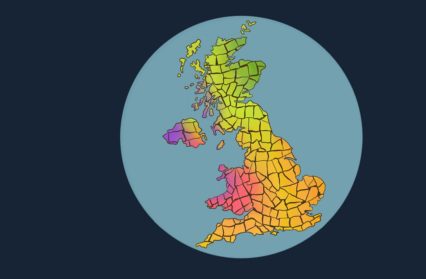Ahead of the premiere of his radio play, as part of BBC Radio 4’s United Kingdoms series, Greg Glover explores the journey of developing and trusting his own playwrighting voice.
I noticed early on as a writer that, after the initial euphoria of getting my characters out into the world, I’d often feel disconnected from what appeared on the stage or screen, even once asking for my name to be removed from a lumpen mess – something which doesn’t have quite the dramatic impact you’d expect when no one knows who you are.
I couldn’t quite understand how something that seemed so great on the page would then limp out across the stage as I blamed the actors or the director for not getting it, or cutting me out of the process, when really it was all down to me and my fear that if I didn’t slavishly follow every script note I’d be replaced or the project scrapped. I lost my voice in a trade-off for getting things put on.

And in hindsight I should’ve been braver, stronger, fought harder for my characters or at least questioned the validity of the notes I was getting, but I didn’t feel I had the right as I moved quickly from one project to another, never really forming a bond in these highly pressurised environments where money and time were always in short supply. These transitory relationships always came with the unspoken caveat that the plug would be pulled if all the changes weren’t implemented, which sounds brutal but isn’t, really, as people would just stop returning your calls.
So, I colluded in producing a sugar-coated, more palatable version of disability which I was told audiences would be more readily able to connect with, (because having a cousin with XYZ apparently gives you a real insight into how my characters should behave). I was told to make them more inspiring, less gritty, and definitely less serious, until self-deprecating humour became my go-to, which as a writing tool can only take you so far.
I would like to say that I had an epiphany where everything just fell into place as I stopped hollowing out my characters at the behest of others, but in reality it was just a build-up of Twitter voices, dogged determination and meeting people who believed in my writing that gave me the strength to begin making the creative process much more of an equal partnership.
I also began to recognise that it wasn’t just the notes I was receiving that helped shape my work, but a whole system that was geared up to only accepting certain narratives. I realised how many times I’d self-censored because, even now, there are arts organisations helping to reinforce these structural inequalities by trumpeting how inclusive their reading panels are and then failing to mention disability with the insidious message laid bare for all to see.
In all probability, I would’ve got more work staged if I’d steered clear of potentially niche narratives but it is more important than ever to keep writing stories that place disabled people in the centre-ground. It is too easy to push them to the margins, to see them as the other, as people to be pitied, ignored, feared, hated or fetishized. Something which leads to real life consequences as these representations are what often inform the basis of how people interact with each other.
So I will keep taking advice and acting on notes, but at the same time I will look much more closely at the place where this advice is coming from and whether it shows understanding, empathy or changes the essence of what I want to say. Audiences don’t need to be shielded or protected from experiences they don’t have. We don’t need to worry that they’ll switch off if something isn’t fun because there’s an appetite for writing that’s truthful, different, and challenging. People, and we as writers, need to remember this and not constrain ourselves, dilute our characters or ideas because even if most of them won’t get made some of them will and these will be the stories that endure long in the memory.
Greg Glover is an award-winning playwright who has had several short films shown on television. He was recently one of the BBC Welsh Voices and received a judge’s commendation from the Wales Writer in Residence award in December of 2020. United Kingdoms











